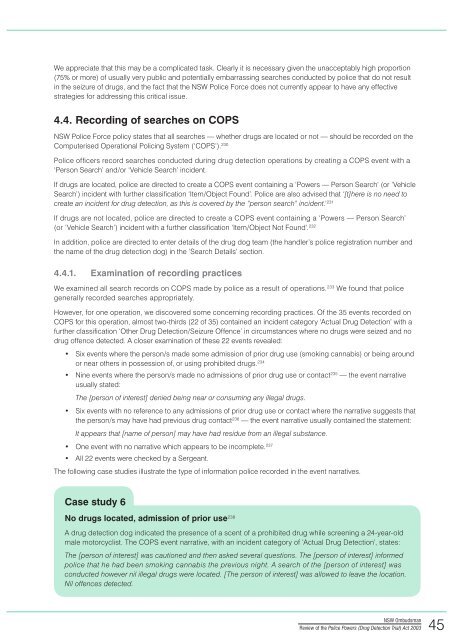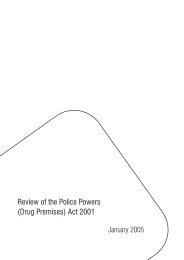Review of the Police Powers (Drug Detection Trial) Act 2003 - NSW ...
Review of the Police Powers (Drug Detection Trial) Act 2003 - NSW ...
Review of the Police Powers (Drug Detection Trial) Act 2003 - NSW ...
Create successful ePaper yourself
Turn your PDF publications into a flip-book with our unique Google optimized e-Paper software.
We appreciate that this may be a complicated task. Clearly it is necessary given <strong>the</strong> unacceptably high proportion<br />
(75% or more) <strong>of</strong> usually very public and potentially embarrassing searches conducted by police that do not result<br />
in <strong>the</strong> seizure <strong>of</strong> drugs, and <strong>the</strong> fact that <strong>the</strong> <strong>NSW</strong> <strong>Police</strong> Force does not currently appear to have any effective<br />
strategies for addressing this critical issue.<br />
4.4. Recording <strong>of</strong> searches on COPS<br />
<strong>NSW</strong> <strong>Police</strong> Force policy states that all searches — whe<strong>the</strong>r drugs are located or not — should be recorded on <strong>the</strong><br />
Computerised Operational Policing System (‘COPS’). 230<br />
<strong>Police</strong> <strong>of</strong>ficers record searches conducted during drug detection operations by creating a COPS event with a<br />
‘Person Search’ and/or ‘Vehicle Search’ incident.<br />
If drugs are located, police are directed to create a COPS event containing a ‘<strong>Powers</strong> — Person Search’ (or ‘Vehicle<br />
Search’) incident with fur<strong>the</strong>r classification ‘Item/Object Found’. <strong>Police</strong> are also advised that ‘[t]here is no need to<br />
create an incident for drug detection, as this is covered by <strong>the</strong> “person search” incident.’ 231<br />
If drugs are not located, police are directed to create a COPS event containing a ‘<strong>Powers</strong> — Person Search’<br />
(or ‘Vehicle Search’) incident with a fur<strong>the</strong>r classification ‘Item/Object Not Found’. 232<br />
In addition, police are directed to enter details <strong>of</strong> <strong>the</strong> drug dog team (<strong>the</strong> handler’s police registration number and<br />
<strong>the</strong> name <strong>of</strong> <strong>the</strong> drug detection dog) in <strong>the</strong> ‘Search Details’ section.<br />
4.4.1. Examination <strong>of</strong> recording practices<br />
We examined all search records on COPS made by police as a result <strong>of</strong> operations. 233 We found that police<br />
generally recorded searches appropriately.<br />
However, for one operation, we discovered some concerning recording practices. Of <strong>the</strong> 35 events recorded on<br />
COPS for this operation, almost two-thirds (22 <strong>of</strong> 35) contained an incident category ‘<strong>Act</strong>ual <strong>Drug</strong> <strong>Detection</strong>’ with a<br />
fur<strong>the</strong>r classification ‘O<strong>the</strong>r <strong>Drug</strong> <strong>Detection</strong>/Seizure Offence’ in circumstances where no drugs were seized and no<br />
drug <strong>of</strong>fence detected. A closer examination <strong>of</strong> <strong>the</strong>se 22 events revealed:<br />
• Six events where <strong>the</strong> person/s made some admission <strong>of</strong> prior drug use (smoking cannabis) or being around<br />
or near o<strong>the</strong>rs in possession <strong>of</strong>, or using prohibited drugs. 234<br />
• Nine events where <strong>the</strong> person/s made no admissions <strong>of</strong> prior drug use or contact 235 — <strong>the</strong> event narrative<br />
usually stated:<br />
The [person <strong>of</strong> interest] denied being near or consuming any illegal drugs.<br />
• Six events with no reference to any admissions <strong>of</strong> prior drug use or contact where <strong>the</strong> narrative suggests that<br />
<strong>the</strong> person/s may have had previous drug contact 236 — <strong>the</strong> event narrative usually contained <strong>the</strong> statement:<br />
It appears that [name <strong>of</strong> person] may have had residue from an illegal substance.<br />
• One event with no narrative which appears to be incomplete. 237<br />
• All 22 events were checked by a Sergeant.<br />
The following case studies illustrate <strong>the</strong> type <strong>of</strong> information police recorded in <strong>the</strong> event narratives.<br />
Case study 6<br />
No drugs located, admission <strong>of</strong> prior use 238<br />
A drug detection dog indicated <strong>the</strong> presence <strong>of</strong> a scent <strong>of</strong> a prohibited drug while screening a 24-year-old<br />
male motorcyclist. The COPS event narrative, with an incident category <strong>of</strong> ‘<strong>Act</strong>ual <strong>Drug</strong> <strong>Detection</strong>’, states:<br />
The [person <strong>of</strong> interest] was cautioned and <strong>the</strong>n asked several questions. The [person <strong>of</strong> interest] informed<br />
police that he had been smoking cannabis <strong>the</strong> previous night. A search <strong>of</strong> <strong>the</strong> [person <strong>of</strong> interest] was<br />
conducted however nil illegal drugs were located. [The person <strong>of</strong> interest] was allowed to leave <strong>the</strong> location.<br />
Nil <strong>of</strong>fences detected.<br />
<strong>NSW</strong> Ombudsman<br />
<strong>Review</strong> <strong>of</strong> <strong>the</strong> <strong>Police</strong> <strong>Powers</strong> (<strong>Drug</strong> <strong>Detection</strong> <strong>Trial</strong>) <strong>Act</strong> <strong>2003</strong><br />
45

















